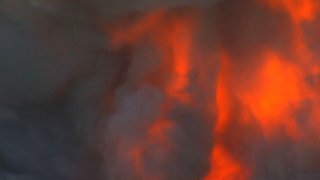
The National Fire Protection Association is warning that as many are staying home to slow the spread of the coronavirus, the risk of home fires may increase.
According to NFPA, cooking, heating and electrical equipment are among the leading causes of fire year-round. With more people home more often, fire safety should be on the mind.
“We already see the majority of fires happening in homes,” said Lorraine Carli, vice president of Outreach and Advocacy at NFPA. “As people spend much more time at home and engage in activities that significantly contribute to the home fire problem, it’s critical that they recognize where potential hazards exist and what they can do to prevent fires.”
Cooking is responsible 49% of home fires, according to NFPA, and with typical household routines upset, officials say there is heightened concern for unattended or distracted cooking.
If you are spending more time in the kitchen during the coronavirus crisis, officials have some safety tips:
- Stay in the kitchen while you are frying, boiling grilling, or broiling food. If you leave the kitchen for even a short period of time, turn off the stove.
- If you are simmering, baking, or roasting food, check it regularly, remain in the home while food is cooking, and use a timer to remind you that you are cooking.
- Keep anything that can catch fire — oven mitts, wooden utensils, food packaging, towels or curtains — away from your stovetop.
- Make sure all handles are turned inward, away from where someone can grab a hot handle or tip a pan over.
- Be on alert. If you are sleepy or have consumed alcohol, refrain from using the stove or stovetop.
- If you have young children in your home, create a “kid-free zone” of at least 3 feet (1 meter) around the stove and areas where hot food or drink is prepared or carried.
NFPA also encourages everyone to be aware of the risks of heating equipment, especially fireplaces, wood stoves and portable space heaters. Make sure to turn off portable devices when you leave the room or go to bed, and always use the right type of fuel for your system.
Electrical devices, especially when charging, can also cause fires. NFPA offered more tips for safe use:
- When charging smartphones and other digital devices, only use the charging cord that came with the device.
- Do not charge a device under your pillow, on your bed or on a couch.
- Only use one heat-producing appliance (such as a coffee maker, toaster, space heater, etc.) plugged into a receptacle outlet at a time.
- Major appliances (refrigerators, dryers, washers, stoves, air conditioners, microwave ovens, etc.) should be plugged directly into a wall receptacle outlet. Extension cords and plug strips should not be used.
- Check electrical cords to make sure they are not running across doorways or under carpets. Extension cords are intended for temporary use.
- Use a light bulb with the right number of watts. There should be a sticker that indicates the right number of watts.
And of course, every home should have smoke alarms on each floor and near all sleeping areas, and carbon monoxide alarms to avoid the risk of CO poisoning.

